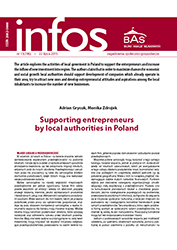
Keywords: Poland; local goverment; local authorities; new investment into region; entrepreneurs;
The article explores the activities of local goverment in Poland to support the enterpreneurs and increase the inflow of new investment into region. The authors claim that in order to maximize chances for economic and social growth local authorities should support development of companies which already operate in their area, try to attract new ones and develop entrepreneurial attitudes and aspirations among the local inhabitants to increase the number of new businesses.
More...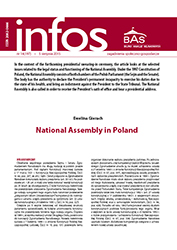
Keywords: Poland; National Assembly;
In the context of the forthcoming presidential swearing-in ceremony, the article looks at the selected issues related to the legal status and functioning of the National Assembly. Under the 1997 Constitution of Poland, the National Assembly consists of both chambers of the Polish Parliament (the Sejm and the Senate). The body has the authority to declare the President’s permanent incapacity to exercise his duties due to the state of his health, and bring an indictment against the President to the State Tribunal. The National Assembly is also called in order to receive the President’s oath of office and hear a presidential address.
More...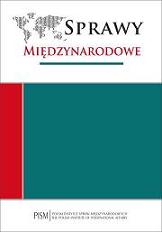






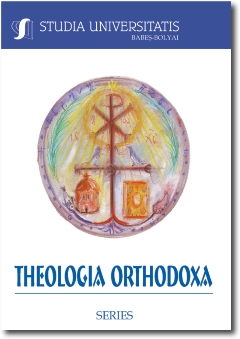
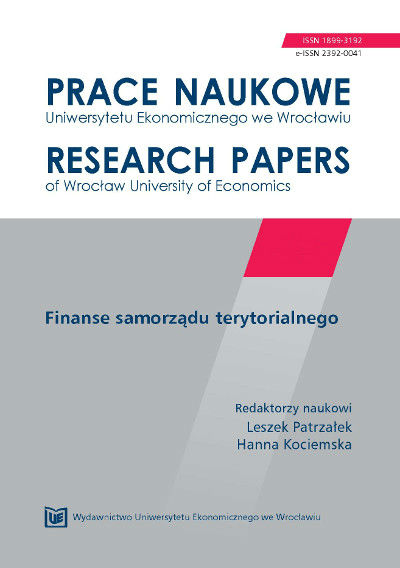
Keywords: eco-innovations; clusters; sustainable development
The article covers information about the most important issues related to innovations. Particular attention was paid to eco-innovations. The aim of the study was to identify possible actions to undertake for supporting and promoting eco-innovations in the Lubelskie Voivodeship. The obtained results have confirmed that eco-innovations are the most important priorities of the activities related to the development of the region. The effects of these activities provide an opportunity to the transformation of the Lubelskie Voivodeship from a region of poverty into an innovative eco-region.
More...
Keywords: social economy; effectiveness; social added value; methods; problems of measurement
Social economy sector has been developing quite rapidly in Poland for several recent years. Entities from that sector have one thing in common – social goals, such as: combating exclusion, social cohesion, full employment, poverty alleviation, equality of women in the labor market, anti-discrimination, forming the basis of participatory democracy, improvement of management in the local environment and stable development. With the development of the social economy in Poland it becomes necessary for its entities to evaluate their effectiveness and efficiency as well as the impact on the environment. The purpose of this article is to present three selected methods and tools for measuring the effectiveness and efficiency of social economy entities, which are currently the most widely used in developed countries. An additional goal is to show the problems and limitations of their use when the Polish third sector organizations try to use those tools. Previous experience shows that most of the social economy entities are not able to use such tools using their own potential staff. They also do not have the ability to use the services of experts (lack of funds). Preparing the article the study of literature (Polish and foreign) was made, and conclusions from interviews conducted by the authoress among the representatives of such entities and institutions supporting their activities (in the framework of leading the training) were used.
More...
Keywords: corporate social responsibility; ecomanagement; environmental initiatives; banking sector
The concept of CSR is one of the most inspiring concepts of the modern economy. One of the key areas of corporate social responsibility in banking is to protect the environment, among others occurring in the form of ecological organization of work and the economic process.
More...
Keywords: public finance; debt; financial resources of the European Union; new financial perspective of the European Union 2014–2020
The article presents legal issues concerning the indebtedness of self-government units, as well as the EU’s procedures connected to the implementation of European funds in Poland. The main question raised in this paper is whether the new legal regulations will support policies directed at the proper development of self-government units and whether there are possibilities to improve financial capabilities of those units. The paper lists the literature on the subject and analyses the existing legal framework concerning public finance which regulates the issue of self-government indebtedness.
More...
Keywords: SME; bank credit; sources of financing
Small and medium-sized enterprises play a very important role in the economy in Poland and in Germany due to the fact that they represent a group which generates more than half of jobs and produces a significant part of GDP. However, for their development an acces to external sources of financing is important. For many years the most popular form of external borrowing has been a bank credit. This study presentes bank credit as a posibility of financing the development of foreign capital SMEs. Italso presents the essence of long-term business cooperation with the banking sector, which has a large impact on the acquisition of a bank credit.
More...
Keywords: CSR; financial market; research on a representative sample; questionnaire survey
The idea of CSR is very popular in modern business and society. The integral and important part of this concept is the issue of the protection of natural environment. Also, the financial market is an excellent case of “business ecologization”. The Polish financial market is no exception. The aim of the elaboration is the assessment of knowledge of Polish society concerning the concept of CSR, especially ecological aspects, based on original own research. In the article the results of research on a representative sample of Polish society are presented. The research was conducted in 2014 in cooperation with GfK Polonia within the project “Ecological Evolution of Financial Market – EcoFin”. Unfortunately, the results are not optimistic, but the critical approach allowed for the better implementation of CSR concept in business practice.
More...
Keywords: risk; exceptional risk; compensation of losses; insurance
Nowadays we more and more often identify the significance of risk which source is external to the organization’s activities, and which accomplishment is particularly severe for its activities. This profile of risk can be referred to as an exceptional risk, which includes, among others, catastrophic risk, ecological risk and environmental risk. The objective of the article is to present and analyse the theoretical aspects of the organization’s functioning within the context of the evaluation of exposure to exceptional risk and pointing out insurance as an instrument adequate for the compensation of losses arising from the materialization of exceptional risk. The applied research methods are based on the literature study from the examined period and on the evaluation of the position of the insurance companies towards the exceptional risk.
More...
Keywords: sickness insurance; SII inspection; proper use of benefits
The article presents issues associated with inspection provided as a part of sickness insurance in the Polish social insurance system. Discussed problems are focused on subjects authorized to inspection and on inspection of proper adjudication about incapacity for work and the use of medical leaves. The analysis of the functioning of inspection, presented in this article, covers the years 2005–2013. The observation that in the considered period of time an increase of inspection activities with the simultaneous increase of questioned amounts, as a result of benefits inspections, occurred, belongs to the most important results that arise from this analysis. It must be emphasized that the results of inspection activity, in respect to general amounts of benefits paid from sickness fund or general number of medical leaves, are not important. With an overall evaluation of the functioning of inspection system, it allows to make a conclusion that its nature cannot be reduced only to detect incorrectness’, but it constitutes some kind of prevention for them not to occur.
More...